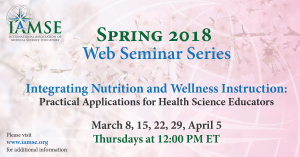
In case you missed the March 8th Webcast Audio Seminar (WAS) Session, here are the highlights of this session:
The Importance of Nutrition in Physician Performance and Well-Being
Presenters: Angela M. Cheung and Maryam S. Hamidi
March 8, 12 PM ET
The Importance of Nutrition in Physician Performance and Well-Being
- Improving physician dietary habits and hydration is a novel approach to supporting wellness and preventing burnout.
- According to a 2017 AMA survey, the burnout rate for physicians had increased to 51%, up from 40% in 2013. Conservative estimates show that physician suicide rates in the US are between 300 and 400 per year.
- Physician burnout negatively affects patient care.
- Emergent studies demonstrate a link between nutrition and physician performance.
- Physicians report that inadequate nutrition and hydration impact their work performance.
- Diet is important in brain health.
- High cognitive demands require proper nutrition for optimal performance.
- Physicians identify the following barriers to healthy eating: lack of nutrition breaks, limited healthy food options in the workplace, limited food storage and eating areas in the workplace, prioritization of clinical work over self-care.
- Nutritional strategies for improving short-term cognitive performance include: hydration, meal timing, meal composition, meal size and strategic use of caffeine.
- Hydration enhances the nervous system. Dehydration can impair cognitive function and mood modulation.
- Coordinating meal times with one’s own circadian rhythms optimizes nutritional effectiveness.
- Thoughtfully balanced meal composition and portion control can enhance cognitive and functional performance.
- Nutritional strategies for increased alertness include: eat larger meals before 10 pm, eat light snacks after lunch that contain protein and carbs, hydrate often, drink coffee or tea (caffeine increases core body temperature), chew gum (improves blood flow to the brain).
- Sustainable individual and institutional interventions are needed to support and improve physicians’ nutrition.
- These nutritional strategies can be applied across all health professions.
- Taking care of oneself leads to better patient care.
For more information on the next session or to register, please click here.